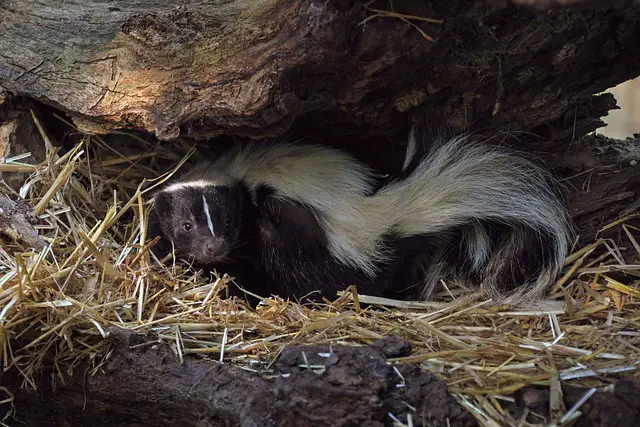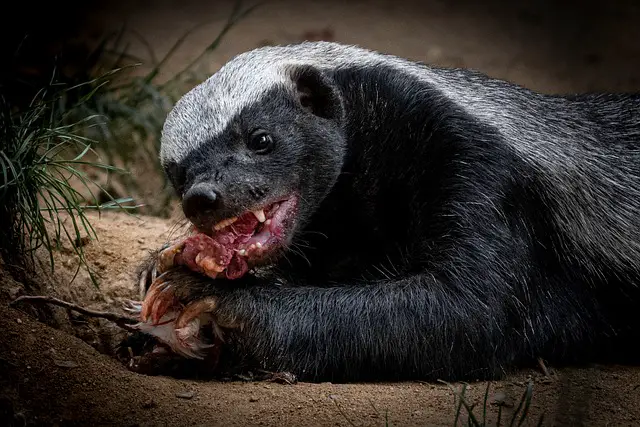Can you eat skunk? You may be wondering that because you just saw a skunk in your backyard and he was not exactly inviting you over to dinner. In fact, the first thought that popped into your head was I want to eat skunk! and then the second thought was How do I cook skunk?
Fortunately, I have some answers for you! First of all, yes, you can actually eat skunk if you know how to prepare it properly, so let’s talk about that first.
Can you eat skunk?
As some may know, eating skunk is not advised for many reasons. It tastes bad, it can cause vomiting and nausea, and can even make you violently ill if prepared improperly. That being said, if a person were to eat skunk out of necessity, most people claim that skunk meat can be prepared in similar ways to rabbit or chicken.
Boiling it works just fine; however, most people believe that stewing it with onions is what makes it taste best in most cases. Preparing skunk meat doesn’t have to be done at home either – there are various places across Canada that offer pre-prepared meals of both rabbit and wild game like deer and elk. Not every place will serve up skunk meat as an option but some definitely do!
Related posts:
Are skunks edible?
That depends on your definition of edible. If you mean delicious, then absolutely not! It’s a real shame because they actually have a lot of meat on them, and plenty of people (in America, at least) eat raccoons and possums for their meat value.
But what about as food for survival? The short answer is that skunks are not safe to eat under any circumstances; if you do decide to prepare them for consumption, it will almost certainly kill you.
Although there’s no documented case of someone eating a skunk and dying—as far as I can tell—there are several accounts of people getting sick after eating them.
Skunk Nutritional Facts
Although wild skunks aren’t typically considered to be a delicious meal, they actually have quite a bit of protein (about 27 grams per 100 grams of meat) and many important vitamins. For example, 1 ounce of skunk contains 13.5 grams of protein and 20 percent of your daily requirement for both niacin and thiamine.
Unfortunately, their mild taste is accompanied by a strong odor that might prove too difficult to overcome for some people. So yes, you can eat skunk—but you probably won’t want to!
Is skunk safe to eat?
People often wonder, can you eat skunk? I say yes, but it’s important to consider a few things before diving into a meal of muskrat. For one thing, don’t go foraging for your own skunk—it’s illegal in most states and should be left to trained professionals.
And no matter where you live or what type of skunk you’re thinking about eating, make sure there aren’t any diseases that could harm humans before breaking out your frying pan. If there are no concerns with either of these issues, then have at it!
It’s perfectly safe to eat skunk if cooked properly and prepared right. Now that we have those safety issues out of the way, let’s dive into some great recipes!
Related post: Can Skunks Climb?
How do you prepare skunk?
To cook skunk meat, you’ll need to remove it from its pelt, then cut it into smaller pieces (no larger than an inch in thickness) and cook it using a stewing or poaching method. This means bringing a large pot of water to a boil, dropping in your skunk meat and simmering for at least 90 minutes.
Then discard any water leftover from cooking and cool your skunk down completely before storing. The longer you let your freshly-cooked skunk chill out before eating, the better—it will continue to tenderize and firm up as it sits. Finally, eat it!
What does skunk meat taste like?
Skunk meat tastes similar to duck and is a popular ingredient in many ethnic cuisines. It is fairly lean, making it an excellent choice for health-conscious consumers. An average serving of skunk meat contains about 170 calories, 0 grams of fat, over 55 grams of protein and very little cholesterol.
If you plan on preparing skunk yourself, here are some tips: try removing any noticeable bones and cook skunk meat at a low temperature. Ground up skunk meat can be used as sausage or added to other recipes that call for ground beef or pork.
What are the benefits of eating skunk meat?
Although it may smell, skunk meat is a great source of nutrients. It contains two to three times more vitamin C than chicken or fish and also contains high levels of protein, vitamins B and D, and omega-3 fatty acids.
However, you do have to be careful not to overdo it; despite its benefits, eating too much skunk could leave you with a smelly bad breath for hours on end.
Cooking your skunk first before eating can neutralize some of these odors. If you’re still interested in consuming skunk meat and want to learn how to prepare it properly here are some easy recipes.
Related post: Can Skunks Climb Trees?
How to cook skunk?
If you want to cook skunk in a way that keeps it from tasting gamy, it’s best to first smoke it. Clean and skin your skunk with care, making sure not to damage or puncture the meat with your knife. Now comes a tricky part: smoking it without using a smoker.
Building an old-fashioned pit smoker is an option—or you can try cooking outdoors in your fire pit or grill. If you’ve never tried cooking meat over an open flame before, be sure to read up on general grilling techniques; smoking requires low heat over long periods of time, which aren’t always compatible with quick grilling.
What are the benefits of eating skunk?
If you live in an area where skunks are plentiful and you happen to be a skilled hunter, you might wonder if there’s any use for them beyond their pelts. Luckily, there is.
Consuming skunk meat or eggs is perfectly safe, so long as you remove certain glands located between its neck and base of its tail (and only if you know for sure it hasn’t been exposed to rabies).
Nutritionally speaking, though skunks aren’t exactly nutritional powerhouses. They have little fat or protein and don’t taste great when cooked — but they do have plenty of vitamins B1, B2 and C.




